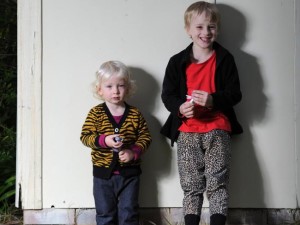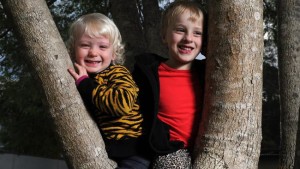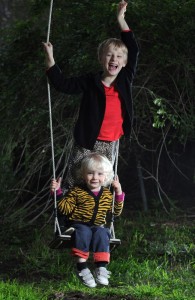Mother breaks free of traditional gender stereotypes and adopts a “gender neutral” approach to parenting.
First published at news.com.au on August 14, 2016.
A GROWING number of Aussie parents are choosing to break free of traditional gender stereotypes and instead adopting a “gender neutral” approach to raising their kids.
Sydney mum Thea Hughes is one such parent who encourages her kids to explore all the options available when it comes to toys, clothing and media, to ensure they don’t feel their choices are limited to the gender-specific options presented to them.
“Our socialisation into gender roles limits our children’s potential to discover unhindered who they are and what they’re interested in,” she says.
“Gender stereotypes are so forcefully pushed on kids in so many different ways — in the use of gender specific language and stereotyping in schools, in the media and in marketing … and I think it’s really important parents consider the detrimental impacts of that.”
She says what she’s trying to do is to encourage her children to not blindly accept what society presents as being appropriate for different genders. She’s teaching them to think critically about the world without making automatic distinctions about what constitutes a ‘boy’ or ‘girl’ and their behaviour and choices.
“I want to assure them that it’s OK to challenge those ideas,” she says. “I try and give them the ability to understand that if they come across people who want to place limitations on them, whether that be in the playground, at school or the park, they don’t necessarily have to take that on board.”
Thea’s kids are given the option to wear clothes from either gender and encouraged to play with all sorts of toys — not just traditional male ones. Picture: Simon Bullard
PARENTING WITHOUT LIMITATIONS
Thea says there aren’t any hard and fast rules about parenting in this way. “For me it’s about ensuring my kids understand their choices are not restricted to stereotyped notions of who they should be,” she explains.
“I don’t deny my children anything, I just make room for them to really explore what gender is and what it means to them.”
Thea uses male pronouns to describe her kids because, she says, her eldest son identifies himself as a ‘boy’.
“I don’t try and limit my kids’ exposure to gender stereotypes because they’re, for the most part, unavoidable,” she says. “Instead, I use these opportunities to open up conversations with them to get them to think critically about what they’re being presented with everyday.”
She says she’s often surprised that her gender-neutral approach to parenting might be considered extreme or unusual. “I actually think this approach is a lot more normal than people might realise,” she says.
“I like to think that most parents of this generation would believe in gender equality and are parenting to reduce the limitations imposed by gender to some extent.”
She makes the point that there’s actually nothing new about challenging gender stereotypes — there’s been a focus on breaking down gender stereotypes for girls for years through popular campaigns like Pink Stinks and Like a Girl.
Thea describes an incident on her child’s third birthday when his choice of dress-up had been scoffed at by some of the other parents. “He asked for a princess dress because all of his little friends in our mother’s group had them and he wanted one, too,” she says.
“So I bought him this dress and he received a bit of ridicule from a couple of parents, within his earshot, which I found heartbreaking. They said something like, ‘I wouldn’t let my boy wear that stuff’ and I think I laughed and said in reply, ‘Oh, I don’t see any harm in it … He’s having fun and dressing up as a princess, there’s no problem with that’.
“What’s wrong with boys also playing princess dress ups? Or having a favourite baby doll? Why should their imaginative play be limited to pirates and ninjas and cars? Why shouldn’t gender-based barriers be broken down for boys as well?”
‘Boys will be boys’ is exactly the type of stereotype Thea is trying to break. Picture: Simon Bullard
THE GENDERED WORLD OF TOYS
Thea is also one of the co-founders of Play Unlimited; an organisation that believes children should be encouraged to learn through the widest possible range of play experiences.
For the past three years Play Unlimited has spearheaded an influential campaign to encourage Aussie toy manufacturers and retailers to eliminate the segregation of toys along gender lines that’s proven enormously successful.
“Most toy retailers have now removed the categories of ‘boy’s toys’ and ‘girl’s toys’ and replaced those with more functional descriptions of toys like ‘action and adventure’ or ‘outdoor play’,” she says.
“We’re really pleased to see that change is happening and we think most parents see that is a really positive outcome.”
Thea’s involvement with the campaign was inspired by her frustration at the blatant gender stereotyping directed at children. “Gender stereotypes seek to place limitations on choice,” she explains.
“In terms of kids’ development, if we think of toys as being the tools of the trade when it comes to learning and development, if we’re only presenting half the options, then kids are only learning half the skills.
“It was a bit of a shock, actually, that our campaign has been so controversial,” she says.
“To me it seemed like a bit of a no brainer that I wouldn’t be the only one offended by gender stereotypes being forcefully fed to our kids. As it turns out, there are plenty of supporters but there are also plenty of people who accept gender stereotypes as being OK, too.
“I’m sure some of my views challenge people, and that’s OK because some people’s views challenge mine … and I think that’s just part of living in society.”
News Limited Copyright © 2016



